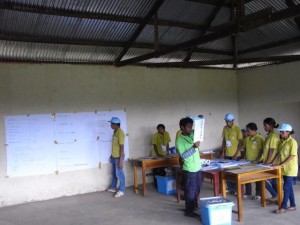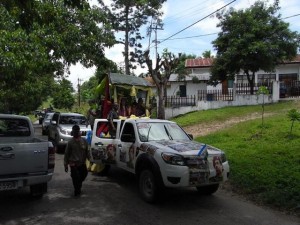A number of friends of the New Internationalist have been in Timor-Leste / East Timor, monitoring the presidential elections. In this eye-witness report Stephen Lavender reflects on this momentous event:
“I had the privilege of observing the Timor-Leste / East Timor Presidential Election in March, a further significant step along the road to a stable democratic system of Government. The thoroughness with which it was organised belied the fact that this was only the third election since independence in a country where communication is still often difficult and some areas are still remote enough to require ballot boxes to be carried on foot to polling centres.
“In the small village polling station I observed, the process on election day was strictly followed and the enthusiasm of the voters was clear. The pride with which they participated was evident from the care that many, especially the older ones, took to dress up for the occasion; a pride I imagine, resulting from their newly won independence.
“Further evidence of the growing maturity of the process was the way the incumbent President, Jose Ramos Horta, accepted the result and committed himself to assist the new President, Jose Maria de Vasconcelas, universally known as Taur Matan Ruak( “Two sharp eyes”) who was elected in a run off election of the two highest vote winners on April 16. Ruak was the last military commander of the resistance and up until last year, commander of the armed forces.
“If the parliamentary election due mid year is carried out with the same maturity, it will be seen as a further important step toward political stability, a situation that must have seemed such a long way ahead following the shooting of Ramos Horta and the threat to Prime Minister Gusmao in 2008.
“The UN police are scheduled to leave Timor-Leste by the end of the year, an important vote of confidence by the UN in the capacity of the Timorese to manage their future. I suspect that the economic impact of their departure will be as significant as the political impact.
“The future political stability of the country in the next few years will be strongly influenced by the process of transition from the old guard to the new. The make-up of the coalition of parties following the Parliamentary election will be an important pointer to the pace of this transition.
“Despite the significant progress made in the 10 years since independence there are daunting issues that face this small country of just over 1 million people. Most dramatic is the future of the half a million young people (45% of the population) who were too young to vote in these elections (under 17 years old). This population bubble is rising up through the school system and approaching the small tertiary education sector and job market. How and for what the youth will be trained is difficult to know, as at present there are few employment opportunities. The new elected President reportedly favours compulsory military service as one way to help the large numbers of young people without jobs. One can hope that skills learnt can be put to good use in building the urgently needed infrastructure. The birth rate, although declining as health improves, is still alarmingly high.
“The divide between the still primitive rural sector and the growing urban centres, Dili in particular, is stark, but not uncommon in other developing countries. How this will be managed is a major challenge.
“One can only marvel at the developments achieved since independence following the centuries of foreign domination. Nevertheless, I hope the best is still to come.”
Stephen Lavender is a Board member for New Internationalist in Australia. He has a long history of social activism, from his days working with labour activists in Korea, to fair trade work with Oxfam and then retail development with Red Cross.
Further reading:
- Policy analyst Chris White provides additional background from his monitoring experience.
- For historical background, don’t miss John Pilger’s groundbreaking report in the March 1994 issue of the New Internationalist magazine.
- The New Internationalist Magazine Guide provides direct access to all of the articles that have appeared in the magazine since 1985.


